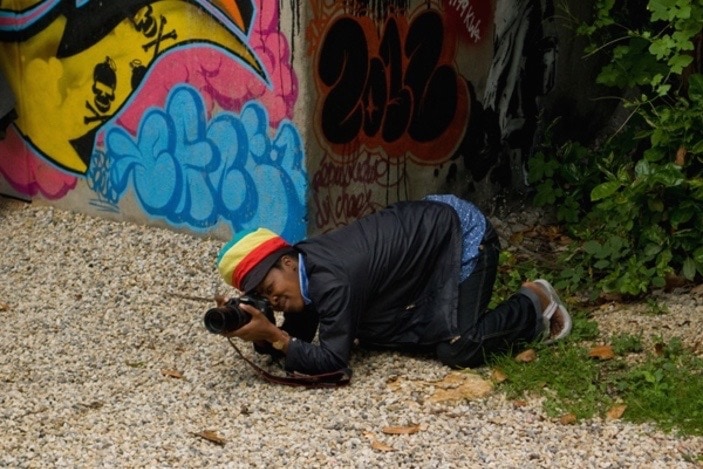This South African photographer uses her portraits of black lesbian women to provide a platform where they can celebrate their identity.
In an interview with the BBC in April 2015, Zanele Muholi spoke about the impact of her work as a ‘visual activist’: “We are doing this in order to be counted. We’re speaking on the edge and challenging all forms of silence. It’s a painful situation, of course, but it helps many others. Slowly, by reading other people’s stories, people are coming out, talking about rape, being a survivor”
In South Africa, a country in the vanguard when it comes to legislation protecting LGBT rights, there runs alongside a dangerous undercurrent of homophobia played out through everyday discrimination and, at its worst, ‘corrective rape’ and murders. Photographer Zanele Muholi describes herself as a ‘visual activist’, responding to anti-gay violence using her portraits of black lesbian women to empower them and provide a platform where they can celebrate their identity.
Muholi’s photographs are hugely influential in South Africa and internationally. She encourages her subjects to look their best, to show off their strengths, to look directly at the camera. Faces and Phases is an ongoing project of portraits that she started in 2006. She explains: “In the face of all the challenges our community encounters daily, I embarked on a journey of visual activism to ensure that there is black queer visibility. Faces and Phases is about our histories and the struggles that we face. Faces express the person, and Phases signify the transition from one stage of sexuality or gender expression and experience to another. Faces is also about the face-to-face confrontation between myself as the photographer/activist and the many lesbians, women and transmen I have interacted with from different places.”
Other Muholi photographs show lesbian couples in intimate poses, images that challenge the stereotypical portrayals of gay women found in the mainstream media. Inevitably, these have caused controversy, notably in 2009 when the then minister for Arts and Culture walked out of an opening event for an exhibition entitled Innovative Women, calling Muholi’s work ‘immoral’. Muholi pointed out that in a country where homophobic attacks are rife, “…we have to be careful. When a minister, or someone in a position of power, makes homophobic comments, it could perpetuate hate crimes. You might be putting people at risk. This issue goes beyond art”.
Her comment is especially pertinent then as now when homophobic violence includes ‘corrective rape’ of lesbians, often gang rapes, and in some cases multiple times, a punishment aimed to ‘cure’ their sexual orientation. She has also photographed the scenes of hate crimes and the funerals of murdered LGBT people.
Yet South Africa is the first country ever to adopt laws that criminalise discrimination on grounds of sexual orientation. It is the fifth in the world to legalise same-sex marriage. But deeply rooted homophobia that is inherent in South African culture means that LGBT people live a life under sexual threat, violence and abuse. Crimes against them frequently go unpunished with a police force permeated with anti-gay prejudice unwilling to take action. This is coupled with a staggeringly high overall murder rate, reported in August 2015 to be averaging at 49 a day, and an acute lack of confidence in police when it comes to reporting rape. In the spring of 2017, two brutal murders of lesbians within days of each other, and closely following a near fatal attack on another, has led to outcry and calls for South African law to recognise that these crimes are not only murders, but also hate crimes.
Muholi’s work, alongside other rights groups, has contributed towards the setting up of the government’s National Intervention Task Team on Gender and Sexual-Orientation Violence Perpetrated Against LGBTI Persons in 2013 that monitors abuses. However challenges remain in bringing abusers to justice. As Muholi points out: “South Africa has its own political agenda … we have laws in place that protect our community but people are still getting killed.” In 2016 a draft law on the Prevention and Combating of Hate Crimes and Hate Speech and is under consideration. While widely welcomed as addressing hate crime, some caution that aspects of the proposed law dealing with hate speech walk a fine line between tackling racism and suppressing free expression.
In 2009, Muholi set up Inkanyiso, an organisation for black lesbians which, as she described in a 2013 Human Rights Watch video, provides a place where the women who feature in her photographs can produce and share their own work, and discuss issues that are not covered in the mainstream media. In it, Muholi states: “We live in fear, and what are we doing about it? You have to document. You are forced to document.”
Muholi, born in 1972, studied photography at the Market Photo Workshop in Johannesburg, and gained her Fine Arts Masters Degree from Ryerson University in Toronto in 2009. From 2003 she has exhibited internationally, winning numerous awards, including in 2013 Index on Censorship Arts Award, the Carnegie Fine Prize and the Prins Klaus Fund award. More recently she has produced self portraits as described in this October 2015 New York Times article that also gives more detail of her life and influences. Muholi and her work is becoming increasingly well known internationally, with two critically acclaimed solo exhibitions being held at the same time at the Stedelijk Museum in Amsterdam, and the Autograph Gallery in London between July and October 2017.



